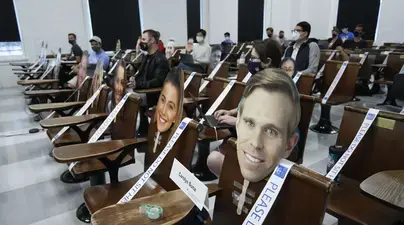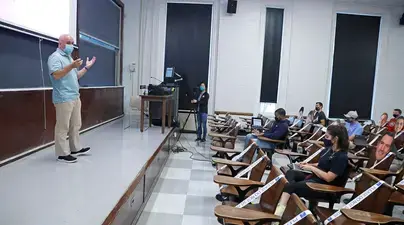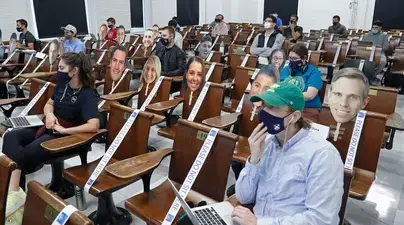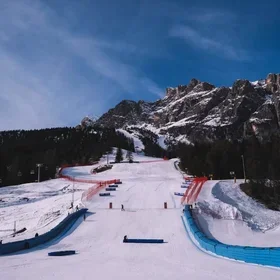Scott Rosner and Joe Favorito, leaders of the Sports Management M.S. program at Columbia University, share lessons learned from a semester of HyFlex learning with Sports Business. You can read the full-length article below.
October 26, 2020 | Sports Business
Scott Rosner and Joe Favorito | The hard-won wisdom we have earned
Columbia University's Scott Rosner and Joe Favorito use the wildly popular theatre musical "Hamilton" as inspiration to describe their unique experiences during the 2020 fall semester.
“Pick up a pen, start writing/I wanna talk about what I have learned/The hard-won wisdom I have earned.”
As faculty in the Sports Management program at Columbia University and huge theater fans, we thought it appropriate to borrow liberally from Lin-Manuel Miranda’s brilliant musical Hamilton about a certain former Kings College (now Columbia) student to “tell the story of tonight” – the fall 2020 semester to date.

As we quietly go about our roles as faculty at the university that Hamilton himself attended (then in lower Manhattan, now in Morningside Heights), we often think about the saddest song in the musical, “It’s Quiet Uptown” – where Hamilton and his family move from the hustle and bustle of lower Manhattan to what is now Washington Heights after the tragic loss of his son.
He walks the streets of the city amidst its quietness, alone with his thoughts. New York and the campus are certainly quiet uptown, something which the “$10 Founding Father” may still recognize from his days in the area. It is that quietness, the lack of chatter in hallways and on campus, and even on the streets around the campus that is maybe the most unusual of our educational experience today.
“Look around, look around at how lucky we are to be alive right now/History is happening in Manhattan and we just happen to be in the greatest city in world!”
While many universities bounce back and forth with the virtues and troubles of online learning, in-class learning, and any combination thereof, our program has settled into a unique routine that consists of a mix of three hybrid (the two that we teach and Professor Carla Varriale-Barker’s sports law course) and 13 online classes. The online courses were a known entity at the start of the fall semester. The hybrid courses were the unknown and what kept us awake at night.
“I don’t pretend to know/The challenges we’re facing/I know there’s no replacing what we’ve lost.”
In the hybrid courses, students who so desire to attend classes in person in very large classrooms in order to maintain social distancing in the classroom while others will participate remotely. Rosner’s course has 21 students seated in a 116-person lecture hall with nine learning remotely while Favorito’s has 12 students in a 96-person classroom with an additional eight learning remotely.

Teaching assistants serve as the in-class intermediaries between the students attending remotely and the faculty member. Camera people were hired and trained to do the filming in the classroom. New class attendance and participation policies were created, as were plans for asynchronous delivery for students in time zone-unfriendly places. While agility, flexibility, and creativity were the guiding principles, it is logistically quite complicated.
“Ladies and gentlemen, you coulda’ been anywhere in the world tonight, but you’re here with us in New York City.”
Our students come from eight countries and nearly 20 states and with three of our classes in a hybrid modality. A majority of our students decided to come to New York City to be “in the room where it happens” and the remainder have the world as their campus while they join online.
“The world turned upside down.”
What’s it like? It’s kind of like being on stage and on-screen at the same time. We try and balance the attention of those sitting in a socially distanced classroom and those online and keep them all engaged and interacting amidst any number of life’s distractions. Our camera person in the room pans to the “audience” (including cutouts of the remote students!) for reactions while the Teaching Assistant watches the reactions of those online, tracks participation, and is the emcee who keeps the flow going for the students learning remotely. A program that encouraged laptop-free classes now requires everyone to be logged in.
While we are able to bring in a myriad of guests via Zoom, making sure that the picture quality, the volume, and the content satisfies all is a challenge. That’s not to forget we are using WiFi in classrooms which were built in 1897, when high speed meant the creation of the phonograph and gramophone. The buildings are beautiful but not exactly state-of-the-art.
“Though, in reviewing the incidents of my administration, I am unconscious of intentional error, I am nevertheless too sensible of my defects not to think it probable that I may have committed many errors.”
Even with all the issues, we have learned and thrived off many lessons we are learning as professionals and teachers in this “HyFlex” environment. We are seeing students, forced to learn remotely, take advantage of the cities they are in by meeting with organizations in their cities about career and networking opportunities. We are able to give our students daily exposure to an audience of high level, diverse influencers in our business who they could never engage with because of time and distance.
We are seeing resilient students who have made it to New York from around the country and world use the time they have in the city to work together and experience a city that is different but still diverse and engaging. We have been forced to recreate a potential learning environment of the future because of the challenges presented today. It has helped us to think differently, to listen differently, and to even act differently as the experience of every day becomes a lesson for us all.

“We in the s*** now/Somebody gotta shovel it.”
Now, this is not ideal in any way. Colleges and universities are losing vital revenue, and students are forced into a learning system that is evolving but is not anywhere near what they had anticipated pre-Covid-19. However, we see in our students and our faculty and staff that the real classroom we have – the global classroom that is still very vibrant, and one that is even less confined by walls and buildings than we had thought. It has given us a look into the future and let us think more about what we can do to change and improve all we have around us in a learning environment.
“You’ll be back/Like before/I’ll fight the fight and win the war.”
It is a true experiment, one we are all engaged with, and as educators, especially in a changed New York, we are growing, sharing, and, yes, learning like never before. It is an environment that we think Hamilton would appreciate, given the chaotic times he lived in. Hamilton adapted to a new city and changing circumstances, and so are we. And some day, “They’ll tell the story of tonight.”
Scott Rosner is a professor of professional practice; academic director, M.S. in Sports Management Program, School of Professional Studies, Columbia University. Joe Favorito is a 35-year veteran of strategic communications, marketing, business development, and public relations expertise in sports, and an instructor at Columbia.


